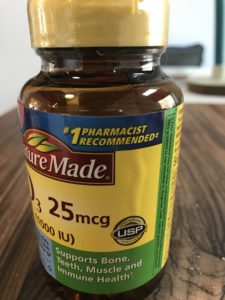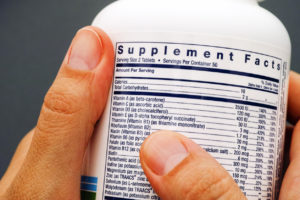This post was developed in partnership with USP
First, the good news: We’re taking care of ourselves better than ever before, and have easy access to thousands of dietary supplements (about 29,000, as a matter of fact, according to the Food and Drug Administration) to help give us the levels of essential nutrients we need that we don’t get solely from the foods that we eat. (Note: Besides vitamins and minerals, dietary supplements include amino acids, enzymes, herbs, animal extracts, and probiotics, and can be manufactured as capsules, tablets, liquids or powders.)
The not-such-good news: Before you hand over your hard-earned money for any supplement, know this critical fact: Not all  supplements are what they claim to be, with the ingredients, potency or purity stated on their labels!
supplements are what they claim to be, with the ingredients, potency or purity stated on their labels!
That’s absolutely right. While dietary supplements might seem similar to drugs, they aren’t required to pass the same kinds of rigorous clinical trials, and aren’t regulated by the FDA as drugs. That means they can be sold without FDA approval and the degree of safety and efficacy testing done on these products is not always clear.
FACT: Dietary Supplements Do Not Go Through the Approval Process Required For Drugs
So, while 76 percent of all Americans take some form of dietary supplement to maintain or improve our overall health (an exclusive FabOverFifty survey of 270 members of our community backs this), we’re not always certain that what’s on the label is in the bottle. Yet, 43 percent of the FOF women surveyed do not have a full understanding of how dietary supplement quality is regulated.
Another alarming fact: Hundreds of supplements in recent years even have been found to be “tainted with drugs and other chemicals,” according to the Federal Trade Commission website. That means some supplements are not only ineffective, but potentially unsafe.
Interestingly, 69 percent of the women who participated in the FOF survey report that they buy the supplement brands “they trust most,” but when the survey asked if there’s any way you can be sure that the ingredients on dietary supplement labels are the actual ingredients in the supplements, a whopping 82 percent said “no” or they’re “not sure.” So how can you unequivocally trust a brand if you’re unsure whether its supplements are actually delivering what they’re promising? The answer is obvious: You can’t!
Setting the Bar For Supplement Standards
I was recently glad to learn, however, that an independent and scientific nonprofit organization, called United States Pharmacopeia (USP), establishes  federally recognized public standards for dietary supplements, and awards a USP Verified Mark to those products that pass its multi-step Dietary Supplement Verification Program. This mark gives us confidence that we’re choosing quality supplements, and assures us that what’s on their labels is in their bottles. USP knows that the “quality of our healthcare results depends on the quality of the products we take.” This is one of those apparent facts we sometimes overlook in our dash to try supplements that promise to do good things for our bodies. Happily, 97 percent of the respondents to the FOF survey said they might be or definitely would be more prone to buy a supplement brand with a verification seal.
federally recognized public standards for dietary supplements, and awards a USP Verified Mark to those products that pass its multi-step Dietary Supplement Verification Program. This mark gives us confidence that we’re choosing quality supplements, and assures us that what’s on their labels is in their bottles. USP knows that the “quality of our healthcare results depends on the quality of the products we take.” This is one of those apparent facts we sometimes overlook in our dash to try supplements that promise to do good things for our bodies. Happily, 97 percent of the respondents to the FOF survey said they might be or definitely would be more prone to buy a supplement brand with a verification seal.
FabOverFifty was pleased to be invited to participate in USP’s “Trust in Quality” campaign to raise awareness of its valuable verification program. After all, being confident in the quality of our supplement choices helps us make good health decisions.
The Mark You Can Trust
Supplements bearing the USP Verified Mark:
1. Contain the ingredients listed on the label, in the stated strengths and amounts.
2. Don’t contain harmful levels of certain contaminants such as heavy metals, pesticides, and microbes. The FDA has discovered hundreds of dietary supplements containing drugs or other chemicals in recent years, particularly in products for weight loss, sexual enhancement, or bodybuilding, according to the Federal Trade Commission website. “The ‘extra ingredients’ could cause serious side effects or interact in dangerous ways with medicines or other supplements you’re taking.”
3. Will break down in the specified amount of time so the dietary ingredients can be dispersed or dissolved to deliver their intended effects.
4. Are made in a facility that follows FDA and USP Good Manufacturing Practices, using sanitary and and well-controlled processes.
USP tests products in its own labs according to USP public standards or other detailed, science-based quality specifications. Its scientists have extensive experience evaluating quality for both drugs and dietary supplements. Over 100 different dietary supplements, representing different brands and retailers, carry the USP Verified Mark. What’s more, USP will pull products off shelves, and test them, to make sure they continue to meet program standards. The USP Verified program evaluates each product individually. Not all of a brand’s products may have completed the process to receive the USP mark.
Over 100 different dietary supplements, representing different brands and retailers, carry the USP Verified Mark. What’s more, USP will pull products off shelves, and test them, to make sure they continue to meet program standards. The USP Verified program evaluates each product individually. Not all of a brand’s products may have completed the process to receive the USP mark.
USP advises us to always consult with our healthcare practitioners before taking any supplement or over-the-counter medication. Although 63 percent of the women responding to the FOF survey reported they don’t typically do this, it seems like it’s time to make a change.


0 Responses to “What You Should Know About Dietary Supplements”
Kathy Watson says:
I do take vitamins and supplements so this info is good to know. I will be more critically alert now